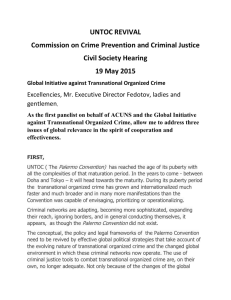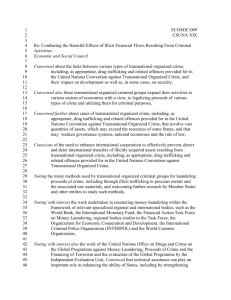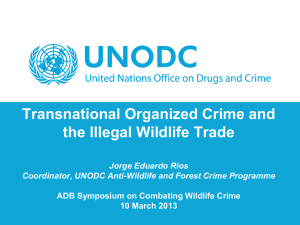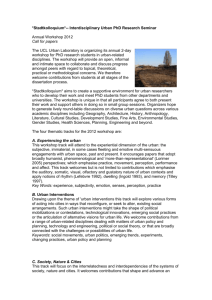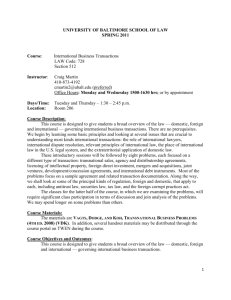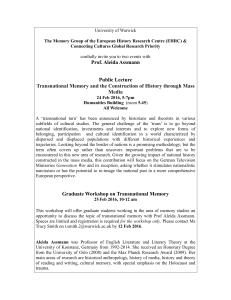Detailed-Course-Outline-2015W-F-Politics_C
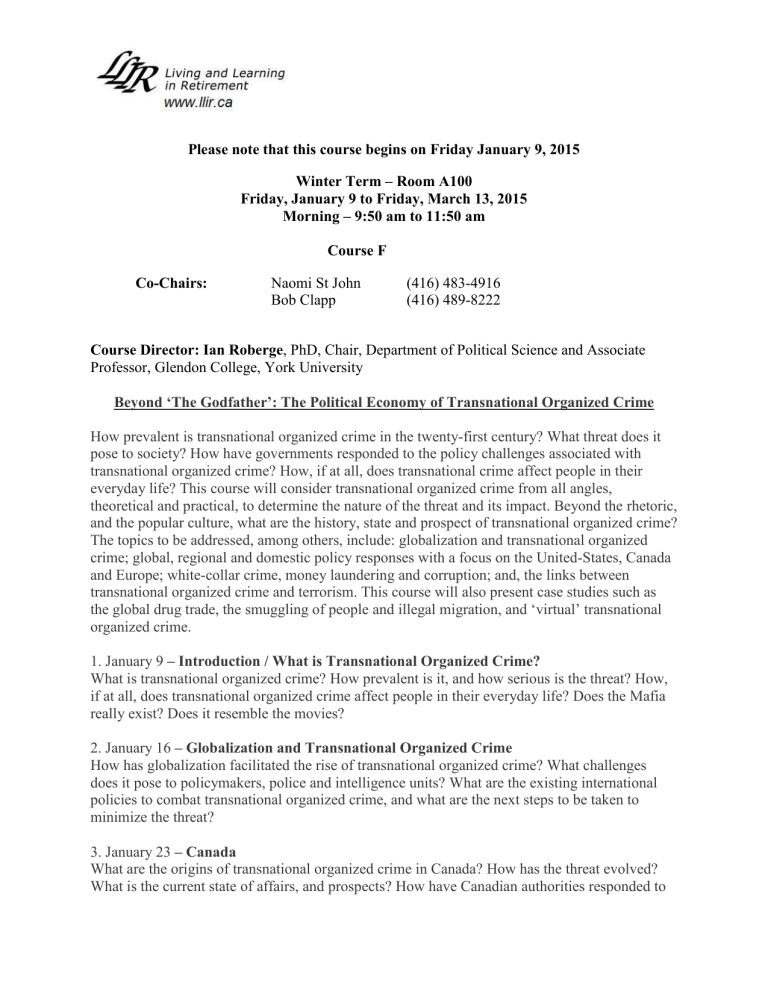
Please note that this course begins on Friday January 9, 2015
Winter Term – Room A100
Friday, January 9 to Friday, March 13, 2015
Morning – 9:50 am to 11:50 am
Co-Chairs:
Course F
Naomi St John
Bob Clapp
(416) 483-4916
(416) 489-8222
Course Director: Ian Roberge , PhD, Chair, Department of Political Science and Associate
Professor, Glendon College, York University
Beyond ‘The Godfather’: The Political Economy of Transnational Organized Crime
How prevalent is transnational organized crime in the twenty-first century? What threat does it pose to society? How have governments responded to the policy challenges associated with transnational organized crime? How, if at all, does transnational crime affect people in their everyday life? This course will consider transnational organized crime from all angles, theoretical and practical, to determine the nature of the threat and its impact. Beyond the rhetoric, and the popular culture, what are the history, state and prospect of transnational organized crime?
The topics to be addressed, among others, include: globalization and transnational organized crime; global, regional and domestic policy responses with a focus on the United-States, Canada and Europe; white-collar crime, money laundering and corruption; and, the links between transnational organized crime and terrorism. This course will also present case studies such as the global drug trade, the smuggling of people and illegal migration, and ‘virtual’ transnational organized crime.
1. January 9 – Introduction / What is Transnational Organized Crime?
What is transnational organized crime? How prevalent is it, and how serious is the threat? How, if at all, does transnational organized crime affect people in their everyday life? Does the Mafia really exist? Does it resemble the movies?
2. January 16 – Globalization and Transnational Organized Crime
How has globalization facilitated the rise of transnational organized crime? What challenges does it pose to policymakers, police and intelligence units? What are the existing international policies to combat transnational organized crime, and what are the next steps to be taken to minimize the threat?
3. January 23 – Canada
What are the origins of transnational organized crime in Canada? How has the threat evolved?
What is the current state of affairs, and prospects? How have Canadian authorities responded to
the threat? Canada: a haven for criminals, launderers and terrorists? (Margaret Beare, York
University)
4. January 30 – Transnational Crime and Transnational Policing
How has the work of the police changed as a result of the globalization of crime? How does law enforcement cooperate to fight transnational organized crime? What are the legal and practical challenges to cooperation, and how can they be surmounted? (James Sheptycki, York
University)
5. February 6 – Europe / Russia
How has the fall of the Soviet Union facilitated the rise of transnational organized crime in
Russia? Who are the oligarchs and what power do they exercise – what is the nature of the relationship between the state and the oligarchs? What is the impact of this political and economic system on society? (Matthew Light, University of Toronto)
6. February 13 – The United States
What are the origins of transnational organized crime in the United States? What is the current state of affairs, and prospects? How has the American government responded to the threat? What role has the American government played in shaping the global regime against transnational organized crime?
7. February 20 – Money Laundering / Transnational Organized Crime and Terrorism
How is ‘dirty’ money laundered? How, if at all, does money laundering threaten society? What are the international and Canadian policies against illicit finance? What are the links between transnational organized crime and terrorism?
8. February 27 – The Drug Trade
How is the drug trade organized around the world? How it is organized in Canada? How ‘big’ is the drug trade? What has been the international community’s approach to combating the drug trade? Has the ‘War on Drugs’ failed, and if so, why?
9. March 6 – Corruption
How prevalent is corruption worldwide and in Canada? What is the impact of corruption on society? What has the international community done to combat corruption? How is ‘big business’ addressing – or hindering the fight against – corruption? (
Ellen Gutterman, Glendon
College, York University)
10. March 13 – Transnational Organized Crime and New Information Technologies /
Conclusion
How has transnational organized crime adapted to and taken advantage of the rise of new information technologies? How have governments responded to the rise of ‘virtual’ transnational organized crime? Do new technologies increase the risk to society from transnational organized crime?


